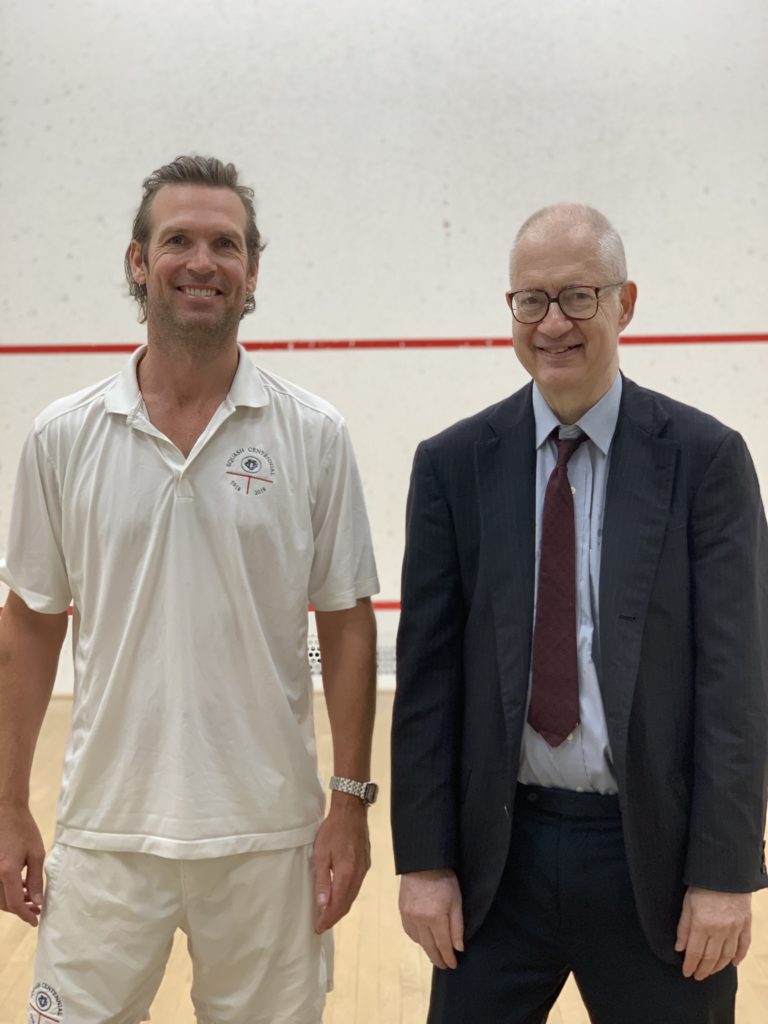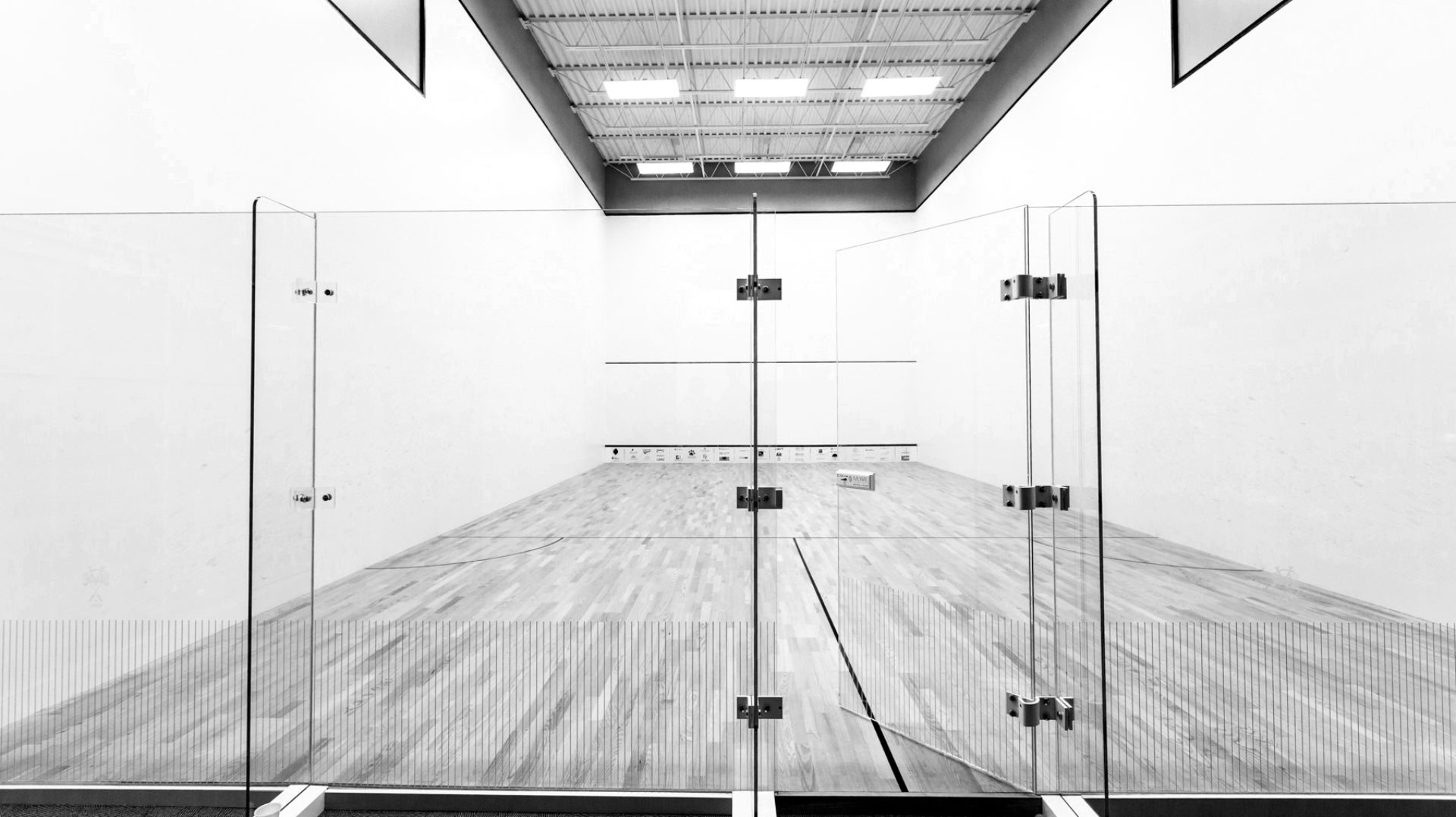September 25th, 2019 —- This weekend will mark the milestone 15th edition of the Maryland Club Open (MCO), which has become one of the most popular and best subscribed tournaments on the Squash Doubles Association (SDA) professional hardball doubles schedule. Partly stemming from its frequent positioning at the very outset of an SDA season, when there is always a furious battle among the top teams to either reassert or undo the prior campaign’s pecking order, and partly due as well to how enthusiastic the club-member turnout has perennially been (as witness the extraordinary size of the pro-am events and the degree to which the galleries are packed throughout the event), this tournament has borne witness over the years to some of the most memorable matches of any venue on the tour. This latter phenomenon began right in the very first evening of the inaugural edition of the MCO, Halloween night in 2003, during which two of the four seeded teams in the eight-team main draw were decisively defeated — Clive Leach and Blair Horler, who six months earlier had emphatically capped off a strong spring-of-2003 run by dethroning three-time defending champs Gary Waite and Damien Mudge in the Kellner Cup final, were ousted in straight sets by qualifiers Alex Pavulans and Chris Deratnay, immediately following which Josh McDonald and Viktor Berg lost, 15-4 in the fifth, to Preston Quick and Jamie Bentley.
Mudge and Waite wound up winning that initial MCO, as well as the two that followed, in each case out-playing different teams in those respective finals — Mike Pirnak/Willie Hosey (who themselves barely avoided being yet another Halloween ’03 first-round casualty by eking out a 15-13 fifth-game win over Chris Walker/David Kay) in 2003, McDonald/Berg in 2004 and Quick/Ben Gould in 2005 — which double-fact points up both how dominant Mudge and Waite had been during that time frame and how evenly matched the teams behind them had become. But Waite and Mudge then lost in the semis of the 2006 MCO to Gould and his new partner (and Australian compatriot) Paul Price, whose 3-1 win in the ensuing final over Quick and John Russell launched the best of the four seasons comprising the Price/Gould partnership, highlighted by their wins that winter over Waite (who retired at the end of that 2006-07 season) and Mudge in the finals of both the North American Open and Briggs Cup.
However, Price and Gould stumbled in the opening tournament of the following season when they let a 2-1, 14-9 semis lead over eventual champs Leach and Walker get away in St. Louis (a rare instance when the MCO was not the first event on the schedule), which may have played a role in their inability to convert a two games to one advantage a few weeks later in the 2007 MCO final, also against Walker/Leach, who seized the momentum early in the fourth game and won the last two games going away. Price and Gould did regain this title one year later in a four-game final over Russell and Quick, after which the MCO took a one-year hiatus in deference to the fact that Baltimore had been selected to host the 2010 U. S. National Doubles for the first time in 14 years (and the12th time overall), with the Maryland Club essentially serving as this championship’s headquarters and flagship venue.
The resumption of the MCO in Autumn 2010 marked the debut of the partnership between Mudge and Gould, who — after many years of battling against each other in an extended three-year Mudge/Berg vs. Price/Gould rivalry during which every one of the 34 full-ranking pro doubles tournaments had been won by one of those teams (with each tandem winning 17 of them and Price/Gould holding the narrowest-possible 9-8 edge in their 17 head-to-head finals meetings) — decided to join forces ahead of the 2010-11 season. They actually trailed Walker and Mark Chaloner 1-0, 7-4 in their opening match but wrested control from that point onward and never looked back, going wire-to-wire undefeated throughout that entire season and capturing the MCO for the first of six consecutive times from 2010-15 prior to Gould’s retirement after he and Mudge had triumphed in the Briggs Cup in December 2015.
Meanwhile, Yvain Badan and Manek Mathur, former mid-2000’s teammates on Trinity College teams that won the college team national championship throughout their college careers, had over the course of several years become the foremost challengers to the Mudge/Gould dynasty and the team that most frequently (including in Gould’s swan-song Briggs Cup) were the tournaments’ runners-up. Once Gould had taken himself out of the picture, Badan and Mathur won the 2016 North American Open and wound up that season as the tour’s No. 1 ranked team. But their shared time at the summit would be brief — by the time the 2016-17 season began, Mathur and Mudge had decided to team up, in the wake of which Badan took on yet another former Trinity College teammate in Michael Ferreira. These two teams clashed in the 2016 MCO final, with Ferreira and Badan edging their opponents, 15-13 in the fifth, when Mathur tinned a reverse-corner on the final point. Somewhat ironically, Badan and Mathur received the SDA Team of the Year Award for the 2015-16 season earlier in the weekend in a presentation on the Maryland Club’s main gallery court less than 24 hours before they would oppose each other in the final.
Little did anyone realize it at the time, but that loss in their debut appearance as partners would prove to be the last one that the Mathur/Mudge pairing would ever sustain. They won all eight tournaments during the remainder of that season as well as all eight in which they played throughout the 2017-18 campaign, during which the MCO was not held since the club underwent a major renovation of its athletic facility, resulting in the addition of a third doubles court. During that 16-consecutive-tournaments-won skein, Mathur and Mudge, (fully worthy successors to the M&M salutation bestowed 57 years earlier on Yankee sluggers Mickey Mantle and Roger Maris when both chased Babe Ruth’s single-season record of 60 home runs during the 1961 baseball season) went 54-0, a run that finally ended not via an on-court defeat but rather due to the severe right-knee injury that Mudge incurred in Buffalo in May 2018 during the final match of that season, necessitating a major allograft procedure on his right knee (his seventh knee surgery overall, the fourth on his right leg) in August that sidelined him throughout the subsequent 2018-19 SDA season.
In his absence, Mathur initially didn’t miss a beat, beginning the season with first-time partner Chris Callis (whom Mathur had rallied to defeat 3-2 ten years earlier at the No. 2 position as part of Trinity College’s epic 5-4 victory over Princeton in the final of the 2009 national-college-championship tournament) and roaring through the 2018 Maryland Club Open without coming close to dropping a single game. Mathur then partnered Zac Alexander through the Denver Club Open draw (again with a string of 3-0 tallies) and teamed back up with Callis in a sprint to the Big Apple Open final, where they steamrolled Badan and Bernardo Samper 15-5 in the first game. To that point, Mathur, the reigning three-time SDA Player of the Year, had opened the season by reeling off 28 straight games, and on that particular night (his consecutive-wins numbers by then having expanded to 18 tournaments and 63 matches) he was playing at his absolute peak, pouncing cat-like on every ball, scorching his drives and catching a half-dozen nicks, a superstar in all his glory, with his parents visiting from India watching proudly from the gallery of the host New York Athletic Club.
The pace and level of play were extraordinary, and there was tremendous energy coursing both on court and through the crowd — until in an instant it all came to a stunning and screeching halt midway through the second game when Mathur suddenly pulled up lame, having ruptured his left Achilles tendon as he started forward to retrieve a shallow Samper forehand cross-court. Mudge was in attendance, sitting on a bench just outside the host venue’s glass back wall, and it seemed a cruelly ironic symbol of how much things can change in a short time and in light of how full of energy and health both he and Mathur had exuded throughout their undefeated 2017-18 season that it was Mudge’s crutch that Mathur had to lean on in order to exit the court after incurring his injury, which required reattachment surgery several days later and ended his 2017-18 season before October had even ended.
With both Mudge and Mathur thus out of action for the rest of the season — and with Callis shortly thereafter joining them on the sidelines with a left knee injury that prevented him from playing in any of the last three events of the Fall 2018 portion of the schedule — the tour became (and remained right till the very end) a kaleidoscope of constantly-changing top-tier partnerships, with a correspondingly undulating set of faces in the winner’s circle and late stages of the draws. There were 43 different semifinalists (10 of them after New Year’s Day), 21 finalists and 16 different tournament winners, seven of whom didn’t reach that stage until Calendar 2019. Only three distinct pairings — Samper/Badan, James Stout/Greg McArthur and Russell/Scott Arnold — won as many as two tournaments in 2018-19 (none of them won a third) and, beginning with the Big Apple Open, the top-seeded team wound up winning the tournament in only two of the SDA circuit’s last 14 events.

Throughout last season and extending well into the summer months, the expectation had been that Mudge would be making his return to the fray this weekend at the Maryland Club, where he had launched his enormously successful partnerships with both Gould and Mathur and where his nine MCO crowns exceeds the total of anyone else (indeed, no currently active player on the SDA tour has won it more than once). But in mid-August, realizing that his leg was still at least several months away from being ready to return to SDA-level competition, and in deference as well to the cumulative effect of a number of other injuries and depleting maladies that have befallen him over the course of nearly two decades of grueling play — among them shoulder and wrist injuries, one of which required the insertion of a pin for several months to stabilize the joint; a painful neuroma and a plantar fascia tear on his right foot; a two-and-a-half-year bout with chronic-fatigue-syndrome; and multiple concussions — the 43-year-old Mudge concluded that the time has come for him to end his doubles career, and he announced his retirement. The most accomplished doubles player in the history of the sport and its “all-time leading scorer” by a wide margin, Mudge with his various partners has won nearly 175 pro doubles tournaments, more than double the number amassed by any other player, and he holds the most-times-won record for every established tournament on the SDA schedule, highlighted by 15 North American Opens, 10 Kellner Cups, six Briggs Cups and 17 David Johnson Invitational titles (all in a row from 2002-18) at the Heights Casino Club in Brooklyn. His Player of The Year and Doubles Team of the Year Awards totals also far exceed anyone else’s, and in all five seasons during the nearly two decades that the SDA and its forerunner, the International Squash Doubles Association (ISDA) have existed in which one team has gone undefeated, Mudge has been on that team: three times with Waite as well as in 2010-11 with Gould and 2017-18 with Mathur. He has also demonstrated amazing versatility by playing his first seven years on the right wall with Waite, then switching to the left wall for a total of nine combined years while partnering Berg and Gould, after which he moved back to the right upon teaming up with the left-handed Mathur.
Mudge’s retirement punctuates a Spring/Summer 2019 period during which some of the all-time best players in squash’s various professional Associations have stepped away from the sport. Five-time British Open champion Nicol David, who also won eight World Opens and enjoyed nearly a decade atop the women’s pro singles tour, retired this past spring, as did three-time World Open Champion Ramy Ashour, two-time British Open champion Laura Massaro and former World No. 2 Jenny Duncalf. In recent years Mudge had been the only SDA player whose playing career dated back to the formation of the ISDA in February 2000, making him the bridge that spanned the early-2000’s top-tier group consisting of Waite, Berg, Leach, Horler, Hosey, Pirnak, Kay, Bentley, Scott Dulmage, Scott Stoneburgh and Anders Wahlstedt, and extended through the Gould/Russell/Price/Quick/Matt Jenson/Greg Park set of stars later that decade and into the next, all the way to the Mathur/Callis/Badan/Ferreira/Samper/Stout/McArthur/Arnold/Alexander/Robin Clarke contingent of players headlining the current era. Throughout that lengthy time frame encapsulating several player generations, the only relentless constant has been Damien Mudge’s standing as the dominant player in professional doubles squash in North America, and his retirement symbolizes the passing of a glorious era in the history of squash on this continent.
So, rather than the 2019 MCO being the tournament at which Mudge made his much-anticipated return, it will instead serve as the first official tournament of the post-Mudge era, and, like many events this past season, it figures to be wide open, highly competitive and anyone’s guess as to its outcome. All three two-time tournament winners last season, namely Samper/Badan (Big Apple Open and Atlanta), Stout/McArthur (Sleepy Hollow and Baltimore Country Club Open) and Russell/Arnold (the season-ending Kellner Cup and Buffalo) — will be vying for this championship, as will 2019 North American Open winners Clarke and Alexander, Jenson and Leach (the only entrants who also competed in the inaugural MCO 16 years ago in 2003) and Ferreira and Will Hartigan. There are several other teams that are fully capable of advancing far into this year’s draw as well. But perhaps the most intriguing entry is that of defending MCO champions Mathur and Callis, both of whom will be marking their competitive return from surgery: Mathur, as noted, with his Achilles tendon reattachment and Callis underwent an arthroscopic procedure on his left knee in late July to clean up some frayed cartilage. How physically capable they (especially Mathur) will be, both individually and as a team, in their impending comeback efforts and how close they can come to replicating the form that enabled them to dominate the action on Eager Street a year ago, will be a defining question in terms of both this weekend and, more broadly, the entire 2019-20 SDA tour.
Whatever turns out to be the on-court set of results this time around, the MCO, under the leadership of the Maryland Club’s long-time Director of Squash Andrew Cordova and his dedicated Tournament Committee, has continued to flourish and grow ever since its inception. The current budget, spearheaded by the four Platinum sponsors — namely T. Rowe Price, Knott Mechanical, Platt Development Group and Merritt Companies — and a host of significant supporting sponsors as well, is more than triple the $47,600 budget for the first edition in 2003, and altogether a total of $1.5 million has been raised to fund the MCO during that time span. The three times that the MCO has by vote of the players received the SDA Tournament of the Year Award exceeds the total of any other site on the schedule, which bears testament to its popularity and to the respect it has earned among the tour group. As a new season begins, there is great excitement among the best doubles players in the world as they prepare to perform at their peak in an inspiring forum at an event with such a rich history and, by all indications, such a promising future.
Rob Dinerman has written the feature article for the Maryland Club Open Program in every year of the tournament’s existence and was the Official Writer for the ISDA/SDA Tour throughout the 12-year period from 2001-13. Ranked as high as No. 10 on the WPSA pro hardball singles tour and as high as No. 16 on the ISDA doubles tour, he has authored seven books, three of which, namely “The Sheriff Of Squash: The Life And Times Of Sharif Khan” (available on Amazon.com), “A History Of Princeton Squash, 1928-2013” and “A History Of Squash At Episcopal Academy”, were published during the 2018-19 season.

